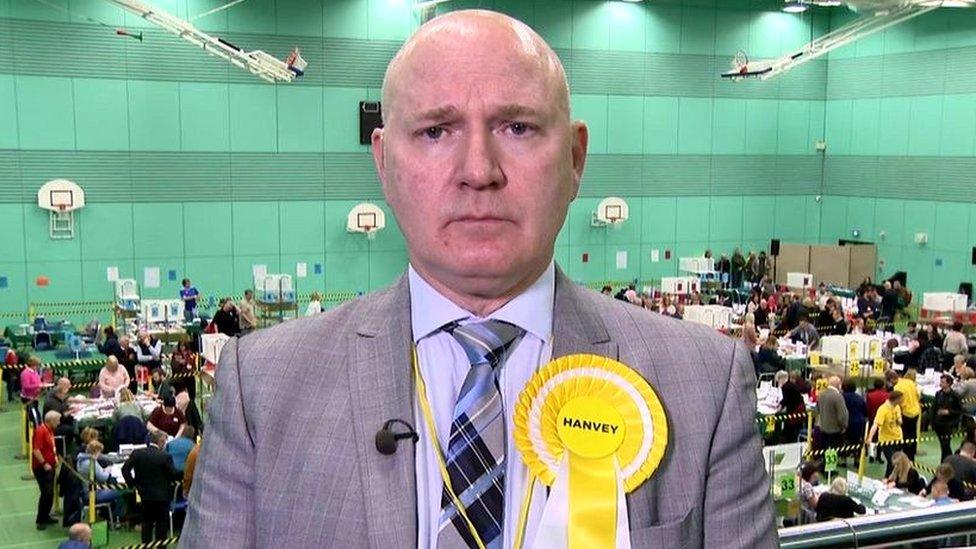MP Neale Hanvey defects from SNP to new Alba Party
- Published
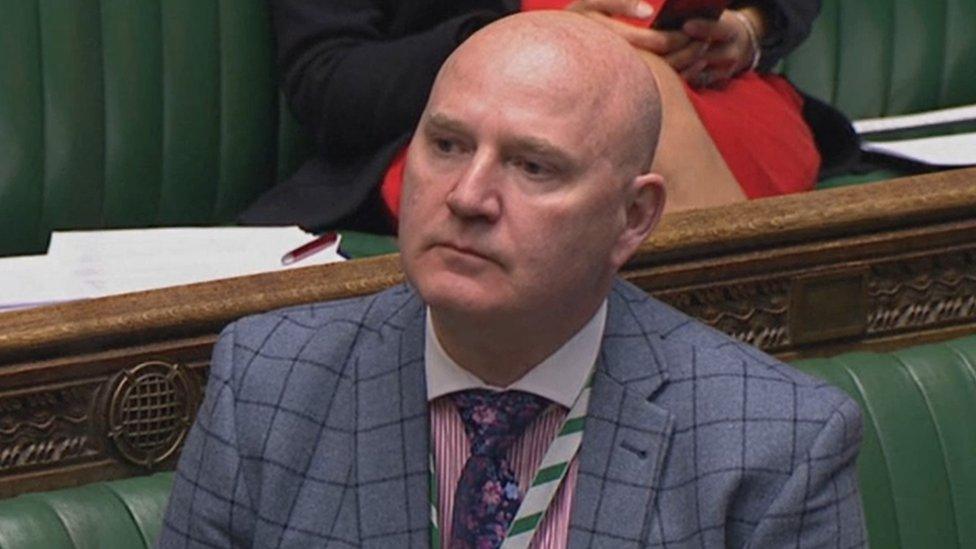
Neale Hanvey was elected to Westminster in December 2019, representing constituents in Kirkcaldy and Cowdenbeath
Neale Hanvey has become the second MP to defect from the SNP and join Alex Salmond's new pro-independence party.
On Saturday, former justice secretary Kenny MacAskill said he would stand as a candidate for the Alba Party.
Mr Hanvey, who holds the Kirkcaldy and Cowdenbeath seat, said the new party provided "a tonic for our movement" .
Alex Salmond launched Alba on Friday with the aim of building "a supermajority for independence" at Holyrood after the election in May.
Mr Hanvey said: "Like so many, I have been angered by our powerlessness in the face of Brexit and share the frustration of many who feel the aspirations of the independence movement are being ignored.
"The Alba Party provide a tonic for our movement with an unashamedly optimistic vision for Scotland's impending transition to an independent European nation."
He added: "The Alba party's growing membership will shape our policy priorities in the coming week. The people of Scotland will always be my priority so it's a very real honour to be standing for Alba and an independence supermajority."
The SNP said only both votes on 6 May "can put Scotland's future in Scotland's hands - not Boris Johnson's".
A spokesman said: "The SNP is focused on tackling Covid and securing a strong, fair and green recovery for Scotland as an independent country in a post-pandemic referendum."
Alba now has more MPs than Scottish Labour who only have Edinburgh South MP Ian Murray.

Two days after it launched, the Alba Party now has a bigger presence in the Commons than either Scottish Labour or the Greens.
Alex Salmond's breakaway from the SNP includes the former Scottish justice secretary Kenny MacAskill, who has talked about forming a group at Westminster - suggesting further defections to come.
So far, the new party has attracted those who empathise with Alex Salmond and his desire for a bigger focus on securing Scottish independence.
With Neale Hanvey and former SNP councillors Lynne Anderson and Caroline McAllister joining today, Alba also appears to be a home for those who fear that gender self-identification for trans people poses a threat to women's rights.
The strongest voice for this argument within the SNP is MP Joanna Cherry who was recently dumped from the party's front bench but she has rejected speculation about her defection.

Mr Hanvey had not always been on the right side of SNP officials. In February he was sacked from his frontbench role as vaccines spokesman.
And during the December 2019 Westminster election campaign he was suspended by the SNP after it emerged he had used anti-Semitic language on a social media post in 2016.
Following his suspension Mr Hanvey said he did not consider himself to be anti-Semitic and was "genuinely and deeply sorry".
'Yesterday's war'
Scottish Conservative leader Douglas Ross said: "Sturgeon and Salmond may now despise each other but they are united by their obsessive determination to rip Scotland out of the United Kingdom.
"All focus should be on the pandemic and our recovery but Sturgeon's SNP and Salmond's ultra-nationalists want this election to be another divisive fight about the constitution.
"With the very real threat of a so-called Nationalist 'super majority', pro-union parties cannot sit on the fence and continuing to do so would be naive in the extreme."
Scottish Labour's campaign co-chairman Neil Bibby said: "The defection of the controversial Neale Hanvey to the Alba Party reveals the utter disarray that the SNP is in. Scotland deserves so much better than this politics of grudge, personality and ego.
"Neale Hanvey and Kenny MacAskill must both stand down and give their constituents the chance to elect politicians more interested in guaranteeing Scotland's recovery than endlessly refighting yesterday's war."
Scottish Liberal Democrat campaign chairman Alistair Carmichael MP said: "Like paint chipping off an old and decaying wall, Neale Hanvey's defection is the latest episode in the Nationalists' bitter, twisted and divided civil war."
Website hacked
Lorna Slater, co-leader of the pro-independence Scottish Greens, said the new Alba Party would not affect her party's chances of doing well at the Holyrood election.
She told the BBC's Andrew Marr programme: "I absolutely don't agree that we are competing for the same voters. Scottish green voters care about the climate, they care about fairness, they care about human rights."
The Alba Party will only be standing candidates in the regional lists in an attempt to boost pro-independence numbers at Holyrood.
Supporters of Alex Salmond's new political project have had details hacked from its website.
On Saturday, it emerged that the Alba Party had details hacked from its website.
The party was alerted to a potential breach of the names of those supporting its events on the site, the day after its launch.
It claims this was the only detail to be hacked and said users could be "confident" the site was now secure.
A statement said: "We apologise that our site did not withstand this breach but assure all supporters that we will not allow this type of black arts activity to deflect from our entirely positive campaign to gain a supermajority for independence in the Scottish Parliament."
The party claimed it had closed the functionality which allowed the breach at 10:30 on Saturday and informed the Information Commissioner's Office of the action.

SCOTLAND'S ELECTION: THE BASICS
What elections are happening? On 6 May, people across Scotland will vote to elect 129 Members of the Scottish Parliament (MSPs). The party that wins the most seats will form the Scottish government. Find out more here.
What powers does the Scottish Parliament have? MSPs pass laws on most aspects of day-to-day life in Scotland, such as health, education and transport. They also have control over some taxes and welfare benefits. Defence, foreign policy and immigration are decided by the UK Parliament.
How do I vote? Anyone who lives in Scotland and is registered to vote is eligible, so long as they are aged 16 or over on the day of the election. You can register to vote online, external.

What impact will the Alba Party have?
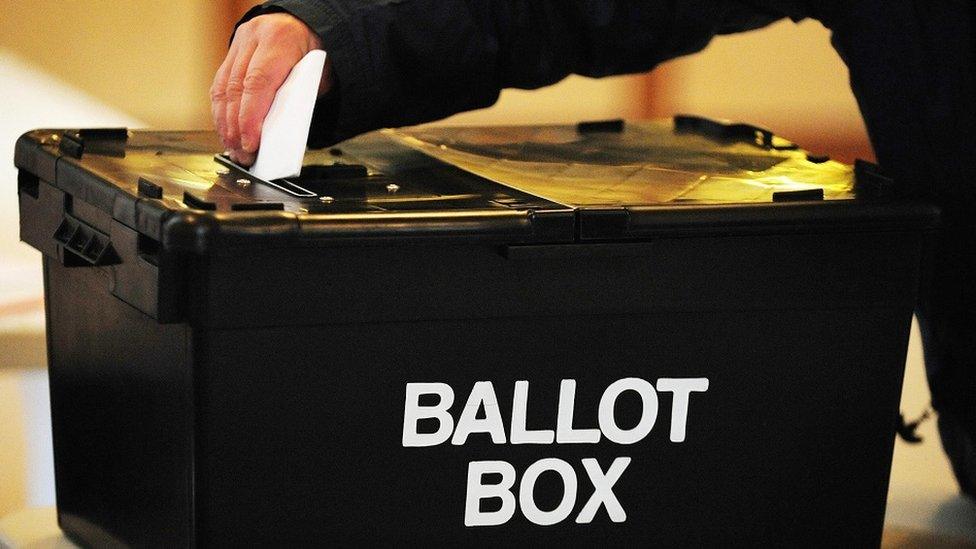
By Sir John Curtice, Professor of Politics at Strathclyde University
The honest answer is, we do not know what impact the Alba Party might have until we get some opinion polls. And the early polls will be important for Alex Salmond.
If they suggest that less than 5% of the public are minded to vote for his party then he is running the risk of emerging from the election empty handed. And if that persists for a couple of weeks or so then we may suddenly discover that the wind has gone out of this particular story.
Remember, for example, BBC Scotland is holding its leaders' debate on Tuesday and Mr Salmond will not be there.
However, what we can look at just now is evidence of opinion polls on how popular or unpopular Mr Salmond is. The Alba Party for the most part is going to be regarded by many as Alex Salmond's party and therefore what they think of Mr Salmond is likely to matter.
The problem Mr Salmond faces is he is not a very popular politician anymore. We have had two opinion polls which asked people if they regarded Mr Salmond favourably or unfavourably. They both came back with the same answer - 14% of the public in Scotland regarded him favourably and among SNP voters, not much higher at about 16%.
If you make the generous assumption that perhaps Mr Salmond might be able to persuade all of those people who are minded to vote for the SNP on the list and think of him favourably and vote for his party on that second ballot then, yes, you can see how he might get 7% or 8% of the vote. That would take the Alba Party over the threshold of picking up a regional list seat. But that is being pretty optimistic, in politics you rarely succeed in getting 100% of a particular niche market.
John Curtice is Professor of Politics and Senior Research Fellow, ScotCen Social Research, external and 'The UK in a Changing Europe'. He was speaking to BBC Scotland's Sunday Show
- Published27 March 2021
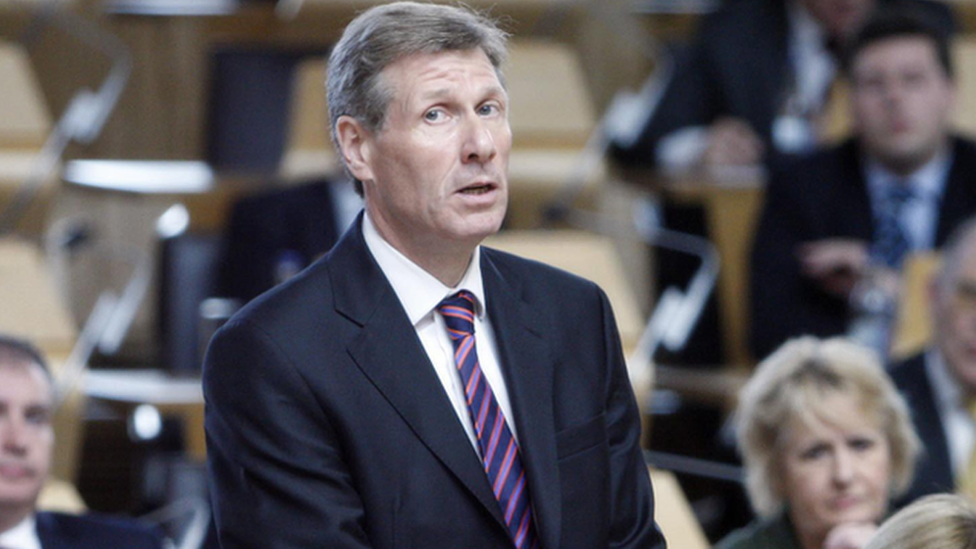
- Published26 March 2021
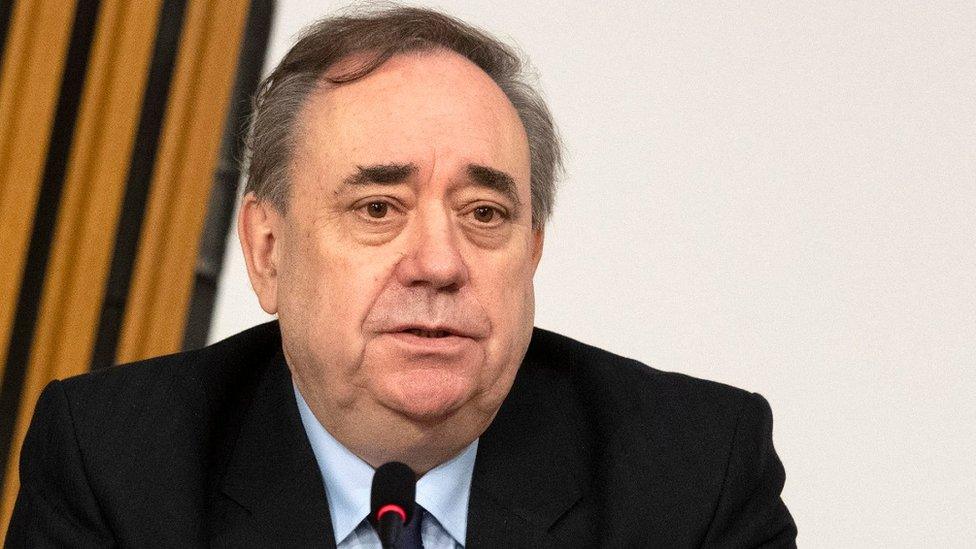
- Published7 February 2021
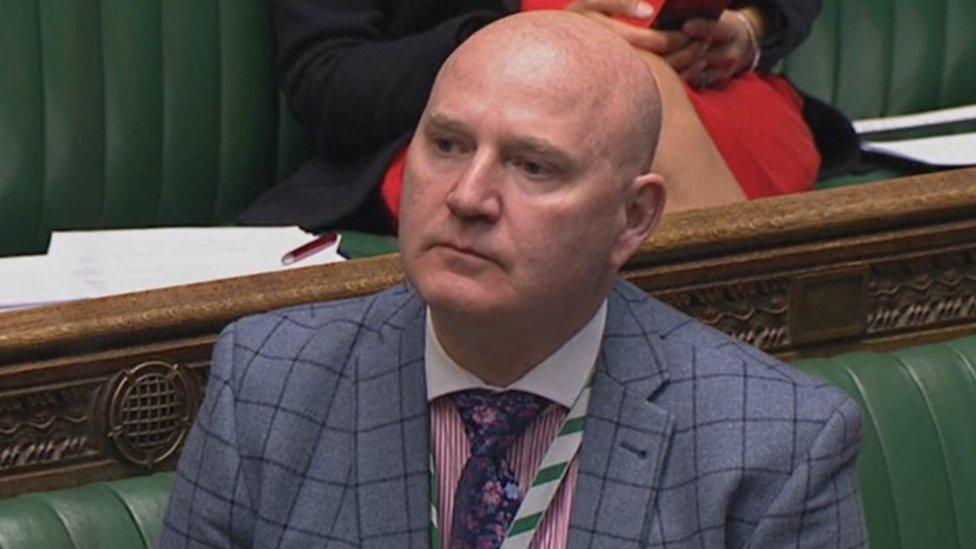
- Published1 December 2020
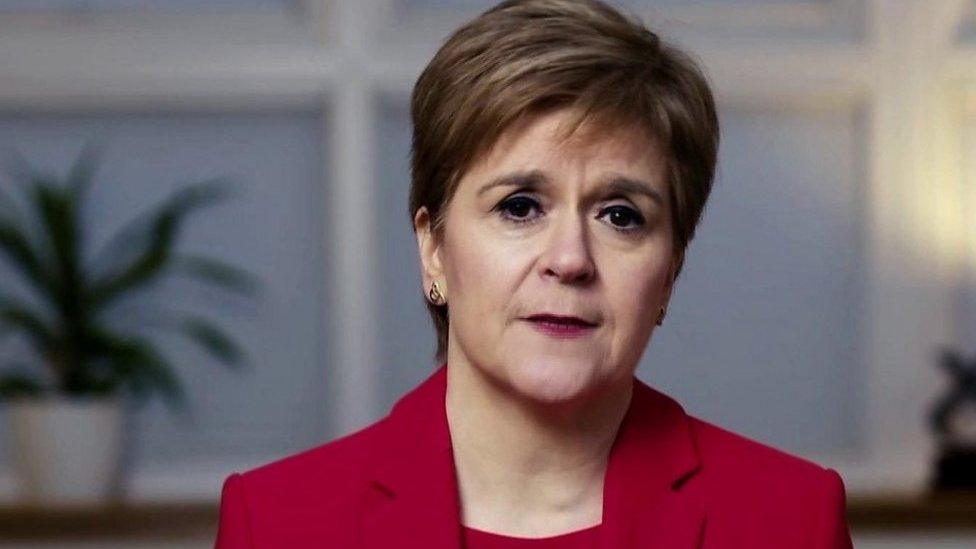
- Published4 March 2020
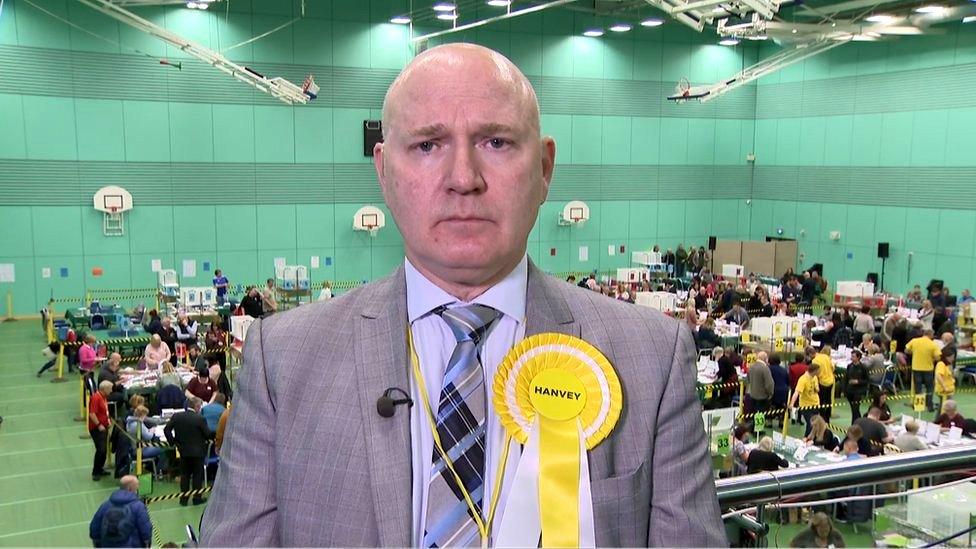
- Published13 December 2019
